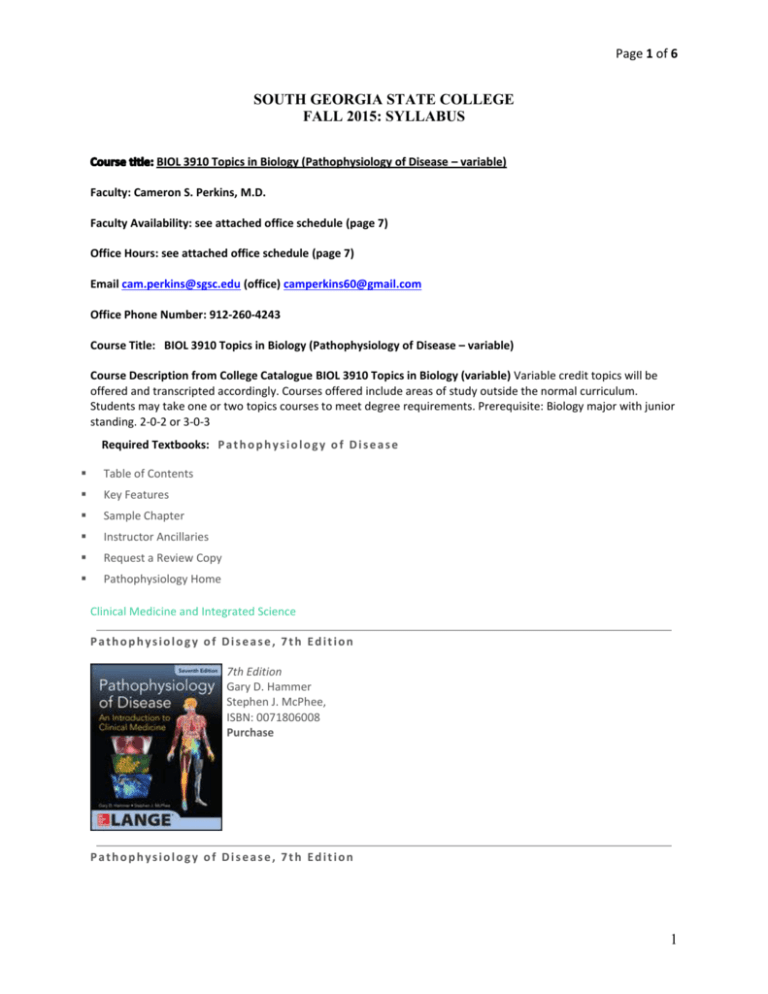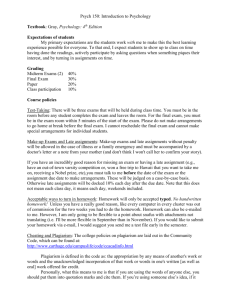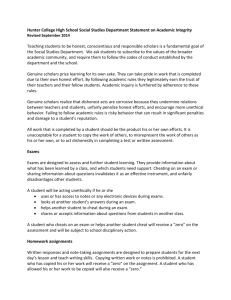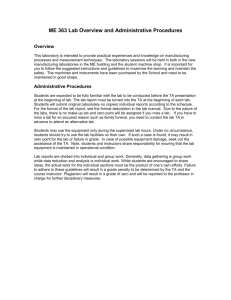
Page 1 of 6
SOUTH GEORGIA STATE COLLEGE
FALL 2015: SYLLABUS
BIOL 3910 Topics in Biology (Pathophysiology of Disease – variable)
Faculty: Cameron S. Perkins, M.D.
Faculty Availability: see attached office schedule (page 7)
Office Hours: see attached office schedule (page 7)
Email cam.perkins@sgsc.edu (office) camperkins60@gmail.com
Office Phone Number: 912-260-4243
Course Title: BIOL 3910 Topics in Biology (Pathophysiology of Disease – variable)
Course Description from College Catalogue BIOL 3910 Topics in Biology (variable) Variable credit topics will be
offered and transcripted accordingly. Courses offered include areas of study outside the normal curriculum.
Students may take one or two topics courses to meet degree requirements. Prerequisite: Biology major with junior
standing. 2-0-2 or 3-0-3
Required Textbooks: P a t h o p h y s i o l o g y o f D i s e a s e
Table of Contents
Key Features
Sample Chapter
Instructor Ancillaries
Request a Review Copy
Pathophysiology Home
Clinical Medicine and Integrated Science
Pathophysiology of Disease, 7th Edition
7th Edition
Gary D. Hammer
Stephen J. McPhee,
ISBN: 0071806008
Purchase
Pathophysiology of Disease, 7th Edition
1
Page 2 of 6
Key Features of the Sixth Edition of Pathophysiology of Disease!
Case-based reviews of the essentials of pathophysiology—covering the signs and symptoms of 120 diseases
commonly encountered in medical practice.
Copyright © 2015 McGraw-Hill Education. All rights reserved.
Student Learning Outcomes:
Define the basic terminology related to pathophysiology
Define and review normal human anatomy and physiology
Define, review, and explore the structure and function of each major body system
Define the basic pathogenesis of human disease
Define and explore the most common disorders and diseases related to each of the major body systems
Define and explore the most common etiologies and predisposing factors associated with human disease
Define the basic approach to diagnosis and use of diagnostic procedures of human disease
Define the basic approach to the prognosis of various disorders based on their pathogenesis
Define the basic approach to treatment of various disorders based on current medical science and clinical
practice
Student Responsibilities: Stay ahead of the text material and formulate discussions of the case studies. At least 1
class lecture/presentation. Complete assignments as prior to class discussions. Generally, assignments will be in
preparation for class discussions which comprise at least 1/7
Methods of Evaluations: multiple choice, matching and T/F take-home (at least 2 of 5) and classroom exams.
Class discussion on case studies is paramount to a successful completion. Students will also be assigned at least
1 lecture presentation of a topic of their own choosing. Students will be given the opportunity to present more
than one class presentation. In so doing the student will add an extra grade to the equation and may find these
presentations is a way to “get extra credit” or improve their final average. Otherwise,
Grading Scale:
The final grade is based on:
Lecture exams (at least 3) + take-home exams (at least 2) + class discussion and participation of case studies (1) +
lecture presentation (at least one) ÷ 7 = Final Grade Average
90 - 100
A
80 - 89.9
B
70 - 79.9
C*
60 - 69.9
D
0 - 59.9
F
*minimum level of competency
2
Page 3 of 6
Some exams will be assigned as a take-home endeavor. Exams will be 100 questions with a variety of matching,
identification, multiple choice and true/false. Class discussions will c/o case studies. Make up lecture exams will be
given only upon receipt of a satisfactory excuse as determined by the instructor (e.g., doctor’s excuse, funeral
program). Makeup exams must be completed on the day of the student’s return to school. By necessity make-up
exams will be short discussion and essay. Missed exams not made-up will be counted as a zero.
Reminder: there is no extra credit except to do extra class presentations using whatever medium the student
chooses. PowerPoint or PDF are a good choice since outlines, tables, charts and images can be presented.
ATTENDANCE POLICY
Attending class regularly allows you to interact with instructors and other students in the learning process.
Students are responsible for attending class and for the material presented in all classes. At the beginning of each
semester, all instructors will inform students of policies regarding class absences. Instructors are responsible for
counseling with students regarding the consequences of absences from classes or laboratories.
Students may independently withdraw from a class by completing the necessary paperwork at the Registrar’s
office. A non-punitive grade for courses dropped after the published deadline can be assigned only with the
approval of the Vice President for Student Success and in cases of extenuating personal hardship.
The following is the Attendance Policy as outlined in the Student Handbook:
1.
2.
3.
4.
Each division will establish attendance policies for each course.
Work may be made up in case of absences with legitimate excuses. Excuses may be judged legitimate by
the instructor involved. If the instructor does not accept the student’s excuse, the appeal procedure will
be the same as the grade review procedure.
Group excuses for college-sponsored activities from the Office of the Vice President for Student Affairs
will be considered legitimate excuses.
It will be necessary that the requirements for each course be distributed at the first meeting of the class.
Additional Faculty Instructions/Course Requirements:
Students may independently withdraw from a class by completing the necessary paperwork at the Registrar’s
office. A non-punitive grade for courses dropped after the published deadline can be assigned only with the
approval of the Vice President for Student Success and in cases of extenuating personal hardship.
Requirements and Policies on Testing and Make Up Exams Specific to the Course:
To get the most from any course, each student should attend all the scheduled classes and laboratory periods. In a
case where that is not possible, the Division of Natural Sciences and Mathematics has the following specific
requirements:
1. A student will be assigned the grade of zero for any assigned class work or exam missed because of an
absence if the absence is not excused by the instructor.
2. A student will be given a grade of zero for any assigned work or exam missed because of an excused
absence if the work missed is not made up.
3. The maximum number of class days that a student can miss and still receive credit for a class is twice the
number of weekly meetings.
4. Make-up work will be completed the day of the student’s return from his/her excused absence. Written
excuses by a Doctor or other Authority such as funeral director are generally required for an excused
absence; however, under dire family emergency excused absences with or without a written excuse will
be considered on a case by case basis.
3
Page 4 of 6
Plagiarism
Plagiarism involves two kinds of wrongdoing. Using another person’s ideas, information, or expressions without
acknowledging that person’s work constitutes intellectual theft. Passing off another person’s ideas, information, or
expressions as your own to get a better grade or gain some other advantage constitutes fraud. Plagiarism is
sometimes a moral and ethical offences rather than a legal one since some instances of plagiarism fall outside the
scope of copyright infringement, legal offence. Plagiarism is almost always seen as a shameful act, and plagiarists
are usually regarded with pity and scorn. They are pitied because they have demonstrated their inability to
develop and express their own thoughts. They are scorned because of their dishonesty and their willingness to
deceive others for personal gain. The act and practice of plagiarism is not only sometimes criminally prosecutable
and always dishonest and
shameful, but it is also intellectually lazy and deprives the plagiarist of an education. Examples of plagiarism
include:
• Any quotation, or even rewording, paraphrase, or summary of another person’s words, thoughts, ideas,
opinions, or theories without appropriate acknowledgement. This example would obviously include any
copying and pasting material from any source, including the Internet, regardless of to what degree.
• The presentation in any form of another’s artistic, literary, scientific, or other creative work as one’s
own.
• Allowing someone else to write one’s paper; copying, buying, or stealing either in part or in its entirety
one’s paper from another source such as a book, an article, or the Internet.
• Appropriate acknowledgement includes, but is not limited to, quotation marks around quoted material
and citation appropriate to the discipline. See the APA and MLA guidelines in the Hodges’ Harbrace
Handbook (Glenn and Gray 552‐650), available in the campus bookstore.
Faculty members reserve the right to add to these rules at their discretion. Any addition to the rules will
be plainly stated in said faculty member’s syllabus. Ignorance of these rules does not constitute innocence
and is not an excuse for plagiarism. Students accused of plagiarism will be referred via the non-criminal
incident reporting system to the Student Conduct Board for hearings to adjudicate said accusation. The
sanctions for plagiarism include at a minimum a zero grade on the plagiarized assignment and may
include failure of the course, suspension and even expulsion from the College. Please refer to the
sanctions section of the student handbook for more information.
SGSC Douglas Campus Syllabus Access Statement
If you have a disability and require reasonable classroom accommodations, please see me after class or make an
appointment during office hours.
If you plan to request accommodations for a disability, please register with the
Office of Disability Services in Room 118, Powell Hall, phone number 912-260-4435. Also, if you find that any
content in this course is inaccessible because of your disability, please contact me as soon as possible.
Academic Support
Academic Support offers various resources to assist SGSC students with their academic success. These resources
are available to SGSC students at no charge and are found at several ASC locations: the Academic Support Center
in room 148A of the Dye Building on the Waycross campus, the Academic Support Center in room 216 of Powell
Hall on the Douglas campus, and the STEM Center in room 125 of Stubbs Hall on the Douglas campus. All locations
offer course-specific peer tutoring, academic skills workshops, and resources on study skills, time management,
note-taking, and learning strategies. Live, online tutoring is also available 24/7 in GeorgiaVIEW through tutor.com.
For more information about any of the resources available, contact Amber Wheeler, Academic Support Director, at
amber.wheeler@sgsc.edu or visit our webpage at:
http://www.sgsc.edu/current-students/academicsupportcenter.cms.
Counseling Statement for Douglas and Waycross Campus
4
Page 5 of 6
Counseling Services are confidential and available upon request. If you would like to schedule a session, referral
forms are located online at
http://www.sgsc.edu/current-students/counselingservicesinformation.cms
or outside the counselor’s office. Please complete and submit the referral form to the counselor. Do not submit
by email. Once you have submitted your form you will be contacted by phone to set up an appointment. The
Counselor’s Office is located on the Douglas Campus in Powell Hall, Room 119, phone number 912.260.4438, or
Waycross Campus in the Dye Building, Room 130, phone number 912.449.7593.
COUNSELING SERVICES:
The Counseling Center operates on an open door policy, however, appointments are accepted. Services are
confidential and free to SGSC EP and GSW students. Please call or come by if you need further information. The
Counseling Center is located in the Student Success Center, Room 3401 & 3402, phone number 229.931.2708 or
229.931.2376.
GeorgiaVIEW
We may use the GeorgiaVIEW from time to time. Your syllabus will be posted on my website @ SGSC.edu or in this
course management system and your instructor will provide additional information. Go to Self-Service Banner to
obtain your school email address. Then:
Click the Personal Information Menu tab
Click View email addresses
Your D2L username will be the part of your email address prior to the @ sign
Go to https://sgsc.view.usg.edu/, click “Forgot Password”
Read the information, enter your username, and click Submit
A reset password link will be sent to your student email.
SATISFACTORY ACADEMIC PROGRESS (SAP) STANDARDS FOR FINANCIAL AID
The U.S. Department of Education requires institutions of higher education to establish minimum standards of
satisfactory academic progress for all students enrolled in a degree program, regardless of whether federal aid was
received. Satisfactory academic progress (SAP) means that a student is progressing in a positive manner toward
fulfilling the requirements for a degree. Failure to maintain satisfactory academic progress will result in the loss of
all federal and state aid.
5
Page 6 of 6
6








